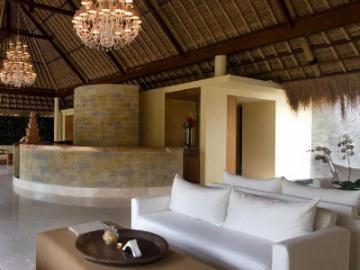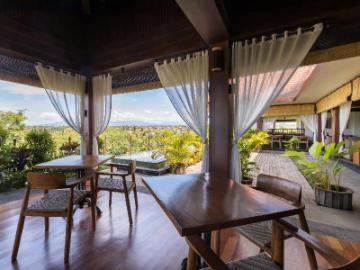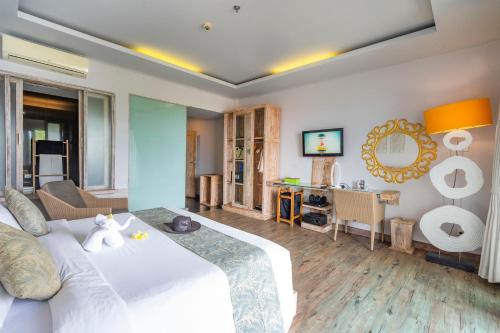The Sweet Orange Walk is one of Ubud‘s most popular walking circuits. It’s a loop trail that combines both the Subak Juwuk Manis and the Kajeng rice fields. Of the town’s many rice field trails, it’s the most central and easily accessible, and it runs roughly parallel to the nearby Sari Organic Walk trail. The walk is quite easy as it takes place mostly along flat terrain, and you’ll cross many cafés, and stores along the way, particularly as you walk through Kajeng village towards the rice fields. To help you plan this perfect escape from Ubud’s busy streets, we put together this guide on the Sweet Orange Walk trail amongst the Subak Juwuk Manis and the Kajeng rice fields.
Disclosure: This page (Sweet Orange Walk – An Ubud Guide) may contain product affiliate links. At no additional cost to you, we may receive a commission for purchases made through these links. More details can be found on our disclosure and policies page.
Planning a Trip to Bali?
You might be interested in these pages:
Best Things to See and Do in Ubud
Best Things to See and Do in Gili T
The Perfect Three-Week Bali Itinerary
Best Things to See and Do in East Bali
We also highly recommend these travel guidebooks:
Lonely Planet Bali, Lombok & Nusa Tenggara
Bali: The Solo Girl’s Travel Guide
Rough Guides: Bali and Lombok





Sweet Orange Walk – Location & Map
The Sari Organic Walk trail is located near north-central Ubud (link to Google Maps).

How to get to the Sweet Orange Walk trailhead from Ubud
The Sweet Orange Walk trail’s name comes from the Sweet Orange Warung, a café located along the trail between rice fields. As we alluded to above, this trail follows a path that allows you to combine both the Subak Juwuk Manis Rice Fields and the Kajeng Rice Fields — many people will use these names interchangeably, they generally refer to the same section of rice fields that the Sweet Orange Walk trail meanders through.
There are also many different routes you can take. The shortest route is a 2km loop:

You can also add an out-and-back section around the midway point of the loop. There’s no specific endpoint, but we recommend turning around when you see signs for Juwuk Manis Hotel, which will make the trail 3 km in total. You can definitely continue further, but soon after you’ll come across sections of the trail that are less maintained, much narrower, and more difficult to navigate due to significant vegetation overgrowth.

Before deciding how long you want to walk, you might want to decide which side of the trail you want to start with. We started with the Kajeng side, but there’s definitely no wrong way to go about it.
If you are already in Ubud, the simplest way to reach either start point is on foot. From Ubud Palace (near the corner of Jalan Raya Ubud and Jalan Monkey Forest), which is often considered the center of town, you can reach either of them in under 5 minutes.
Starting with the Kajeng Rice Fields
You’ll first want to head to the intersection of Jalan Raya Ubud (Ubud’s main east-west road) and Jalan Kajeng (link to Google Maps), which lies immediately east of Ubud’s Water Palace (Pura Saraswati). From there, you will enter Kajeng, one of several small traditional villages that make up Ubud. You’ll first go through the lively and colorful Kajeng Market, where you’ll find various sells clothing, handicrafts, and other traditional local items.









At the far end of the market, the road narrows and turns into a pedestrian and bike route only, as it slowly makes its way toward the sprawling rice fields.


Starting with the Subak Juwuk Manis Rice Fields
The trail to the Subak Juwuk Manis Rice Fields starts from a narrow alleyway next to the Puri Lukisan Museum on Jalan Raya Ubud (link to Google Maps). The alleyway is easy to miss, but easier to spot once you know which sign to look for:

You’ll first walk between a few buildings (including some that look in partial disrepair) before emerging in a lush and dense jungle and an interesting art installation.





The jungle-looking section is short-lived as you’ll soon emerge into an open area with rice fields as far as the eyes can see.
Getting to Ubud from elsewhere in Bali
Drive times from elsewhere in Bali can be highly variable depending on the traffic conditions.
Distance from Kuta: 40 km // Average Drive Time: 1h20 – 1h40
Distance from Canggu: 30 km // Average Drive Time: 1h10 -1h30
Distance from Sanur: 25 km // Average Drive Time: 1h -1h20
Distance from Sidemen: 30 km // Average Drive Time 1h -1h20
We highly recommend Airalo (eSIM card) for your connectivity needs when travelling abroad. Airalo is the world’s first and largest eSIM store with eSIM plans for 200+ countries and regions worldwide.
Finding Parking
The main challenge if coming from out of town is finding parking. The Sweet Orange Walk trail does not have dedicated parking. The nearest lot is the Ubud Central Parking (link to Google Maps), but it only opens to cars around 10 am when the morning farmer’s market ends. Parking here is fortunately relatively cheap (5K IDR for vehicles, 2K IDR for scooters). This car park is located about a 5-to10-minute walk from the Sweet Orange Walk trailhead.
It’s often easier to find spaces in Ubud’s largest car park by the Monkey Forest (link to Google Maps). However there are two drawbacks to using it: 1) it is more expensive (same rates as above but charged by the hour instead of a single fee), and 2) it is significantly further from the trailhead (about a 25-minute walk), which when including the return walk will more than double the original duration of the Sweet Orange Walk.
Transport Options
In our opinion, the two best transport options to reach the Sweet Orange Walk trail are: renting a scooter (moped) or hiring a car and driver (which really isn’t as expensive as it sounds). One of the main advantages of using a private driver in this case is that they will simply drop you off near the start of the trailhead and take care of finding parking.
You can also use Bali ride-hailing apps such as Gojek or Grab, and make use of local taxis, but these options will typically cost more, especially if you plan on visiting several sites and attractions on the same day. Also, Gojek or Grab are not authorized to pick up people in certain locations where local taxi unions limit their services, including Canggu, Sanur, and Ubud. For more information on getting around the island and the different available options, check out our guide on How to Best Get Around Bali.
Getting to Ubud by Scooter: Once you get to Bali, you’ll quickly realize that scooter rental operators are everywhere. Although most street-side vendors will regularly be the cheapest option, they come short in several other aspects compared with more reliable and established vendors. For instance, most won’t offer roadside assistance or insurance that covers theft, nor do they regularly sanitize the helmets or have their scooters undergo regular maintenance. For this reason, we highly recommend using Bikago for your scooter rentals. Renting from them might be slightly more expensive (but still can be rented for as low as 12-15 US$/€ per day) but you get great peace of mind as among many other perks, all scooters undergo extensive quality checks.
What you get with your Bikago rental:
-Helmets
-Full tank of petrol and unlimited mileage
-Free Delivery and Collection at your Hotel
-24/7 Roadside Assistance and First Aid Medical Kit
-Charging Mobile Phone Holder
By Car and Driver hire: Hiring a car and driver to explore Bali can be a practical and cost-efficient way to experience a full day of sightseeing. Although this option is more expensive than renting a scooter (typically 40-60 US$/€ per day), you don’t have to worry about navigating the Bali roads and traffic. Also, most cars are modern and air-conditioned, which is welcome in Bali’s humid heat, and the local drivers always know the best routes to take and can optimize your ideal itinerary. Here are some of the best options to choose from:
Sweet Orange Walk – Cost and Hours
Entrance Fee
There is no fee to do the Sweet Orange Walk – it is completely free.
Opening Hours
The Sweet Orange Walk trail is open 24 hours. The cafes and warungs found along the trail typically don’t open until 8 or 9 am.
Facilities
The trail itself doesn’t have any facilities such as washrooms, but you’ll encounter several small restaurants, warungs and cafés that will no doubt let you use their washrooms with a food or beverage purchase.
What to Bring and What to Wear
Although there’s a fair amount of palm trees along the trail, there are long portions of it where there is very little shade to be found, so applying sunscreen and/or wearing a hat is a good idea. Bringing some bottled water (or some other form of hydration) with you is also a good idea.
The trail path is relatively flat and easy to navigate, but the stones that the path is made out of can be slick or slippery. Although we saw some people wearing flip-flops on the trail, we would still recommend proper walking footwear.
Also, be aware that rice paddies are often full of water and are ideal breeding grounds for mosquitos. We didn’t notice any during our walks here (toward the end of the dry season in September), but we still used insect repellant not wanting to take unnecessary risks with mosquito-borne illnesses.
Best Time to do the Sweet Orange Walk
Best Time of the Year
Although we walked the trail during the dry season, there’s no bad time of year to do the Sweet Orange Walk. There’s a higher risk of rain during the wet season (November-April), and there’s also likely to be more mosquitoes. On the plus side, however, there are likely to be fewer other tourists around.
Consider off-peak months like May-June or September-October for a more personal experience with fewer crowds.
Best Time of Day
The best time to visit is definitely in the early morning when it’s cooler and when there are far fewer other people along the path; we recommend starting somewhere between 730 am and 9 am. You will be able to enjoy a much more relaxed atmosphere with some beautiful golden morning light.
If you can’t make it early in the day, try the late afternoon or early evening around sunset. It will likely still be quite warm out, but at least the number of other people on the trail will have started to thin down.
Sweet Orange Walk – Trail Details
Length: As we mentioned above, the trail doesn’t have a specific endpoint, and the length of the trail can vary between 2 km and 3.5 km, depending on if you just do the loop or also add the out-and-back section. You can continue even further but know that the trail isn’t as well-manicured or maintained as you continue northward.
Trail Difficulty: The trail is not difficult at all and is suitable for almost everyone, regardless of age or fitness. The trail is relatively flat the entire way.


Sweet Orange Walk – How Long Do You Need?
Most people can expect to complete the longer version of the walk in under an hour when walking at a leisurely pace (the short 2 km loop can be completed in under 30 minutes by most). But you might want to plan for more time if you think you’d like to stop at one of several cafés or restaurants, or if you would like to shop at one of several art or gift shops you’ll cross along the way.
Sweet Orange Walk – What to Expect
Once you reach the rice fields, you will feel like you are a world away from Ubud’s busy streets. You’ll no doubt notice that the fields were at various points in the growing process: some will have just been harvested, others just planted, while others will be ripe for harvest.
You’ll notice a mix of old farming buildings and the occasional luxurious home or resort in the distance – and, depending on the time of year, you are also quite likely to notice some farmers working their fields.






Finally, also note that while many people come here for a walk, be aware that locals still use their scooters to travel along the trail. They aren’t overly frequent, but you are likely to cross a few along your walk.
Sweet Orange Walk – Is it Worth It?
We definitely think so! It’s an easy walk with scenic views, and it doesn’t get as busy as Ubud’s most famous trail, the Campuhan Ridge Walk.
Given that it’s a relatively short walk, it can also be combined with other short walks around Ubud, particularly those known for their rice field views (see below for further details).
A Note on Connecting the Sweet Orange Walk with the Sari Organic Walk
Many people have found that connecting two scenic rice field walking trails is possible. Indeed, a small bridge connects extensions of the Sari Organic Walk (more on this trail further below) and the Sweet Orange Walk trails. However, it is important to note that the paths leading to either side of the small bridge are overgrown with vegetation, are extremely narrow and are difficult to walk on without falling.
We didn’t attempt to connect the trails as the trail beyond The Rice Joglo restaurant (on the Sari Organic Walk trail) appeared partially impassible due to plant overgrowth, so we can’t specifically recommend it. Many Google Maps reviewers mention that the path that connects both trails is sketchy at best and not maintained; some have even called this section dangerous. Since both walking trails are relatively short, our opinion is that there isn’t much to gain by attempting to shorten the distance travelled by connecting the two. Most people could complete both walks in under 2h30 without attempting to find a shortcut between the two.
Nearby Rice Field Walks in Ubud
There are several rice field walks you can do in Ubud, such as the nearby Sari Organic Walk. Although this trail doesn’t follow a loop (it’s an out-and-back type of trail), it is slightly longer with more time spent among the rice fields. Both walks are quite similar in terms of the scenery seen once in the rice fields.





For a complete list of walking trails, check out our guide on Ubud’s Best Rice Field Walks.
Outside of Ubud, there are several fantastic opportunities to explore other beautiful rice fields, including those of Tegalaland, Jatiluwih, and Sidemen.






Sights and Attractions near the Sweet Orange Walk
The nearest attractions are some of Ubud’s most popular temples to visit. You can easily visit three of them along the main road (Jalan Raya Ubud) that you will likely walk along to reach the ridge walk: Pura Dalem Ubud, Pura Saraswati (Ubud Water Palace), and Ubud Palace. We described each of these temples in great detail in our guide on the Best Temples to Visit in and around Ubud.









Where to Stay Near the Sweet Orange Walk
In our opinion, the best place to stay is in Ubud, whose location makes it a great base from which to explore the Sweet Orange Walk and several other attractions in the Ubud area and central Bali. All of the following are some of the best mid-range hotel accommodations located within walking distance from the city center:
Komaneka at Rasa Sayang Ubud Hotel
















Planning a Trip to Bali?
You might be interested in these pages:
Best Things to See and Do in Ubud
Best Things to See and Do in Gili T
The Perfect Three-Week Bali Itinerary
Best Things to See and Do in East Bali
We also highly recommend these travel guidebooks:
Lonely Planet Bali, Lombok & Nusa Tenggara
Bali: The Solo Girl’s Travel Guide
Rough Guides: Bali and Lombok
Photography Gear
If you like our photography, you might be interested in some of the gear we use to shoot our travel and hiking destinations.
Camera Body – Nikon Z 6ii Fx-series Mirrorless Body
Main Lens – NIKON 24-120mm F/4G ED VR AF-S
Zoom Lens – Sigma 745-306 150-600mm f/5-6.3
Polarizing filters – Urth Circular Polarizing (CPL)
Camera Tripod – K&F Concept 64-inch Camera Tripod
Mini-tripod – Lammcou Flexible Camera Tripod
Camera/hiking backpack – Vanguard Alta Rise 48 Backpack
Universal Travel Adapter – VYLEE Universal International Power Travel Plug
Other Travel Essentials
Travel Insurance
SafetyWing is a travel insurance company that offers comprehensive coverage for travellers. Includes Medical Insurance and Travel Insurance. Primarily geared towards long-term travellers, digital nomads, and expats.
e-Sim cards
Airalo is the world’s first and largest eSIM store with eSIM plans for 200+ countries and regions worldwide. With Airalo eSIMs, travellers can get connected the moment they land at their destination and avoid nasty data roaming charges
eSIMS are a sustainable alternative to single-use SIM cards – they are 100% digital, require less energy to produce and be re-used rather than disposed of.
Car Rentals
Discover Cars is our go-to website for car rentals. We almost always find our preferred rate there.
Transfer from Airport
Welcome Pickups is our favourite private transfer service, which you can pre-book at a fixed price. Currently available in 220 cities all over the world (mostly in Europe, but with several major cities in Asia, the Middle East and the US).
Kiwitaxi is another private transfer service – we haven’t tried it yet, but it’s currently available in a few more countries (102 as of 2024).
Hotels and Accommodations (coming soon)
Photography Prints
If you found this blog useful, you can help support our blog by purchasing low-cost digital prints. Printed physical prints are also available for purchase.








—–
Well, that wraps it up! We hope you enjoyed our Sweet Orange Walk – An Ubud Guide and that it will prove useful for planning your trip.
—–
You might also be interested in these related pages:
















